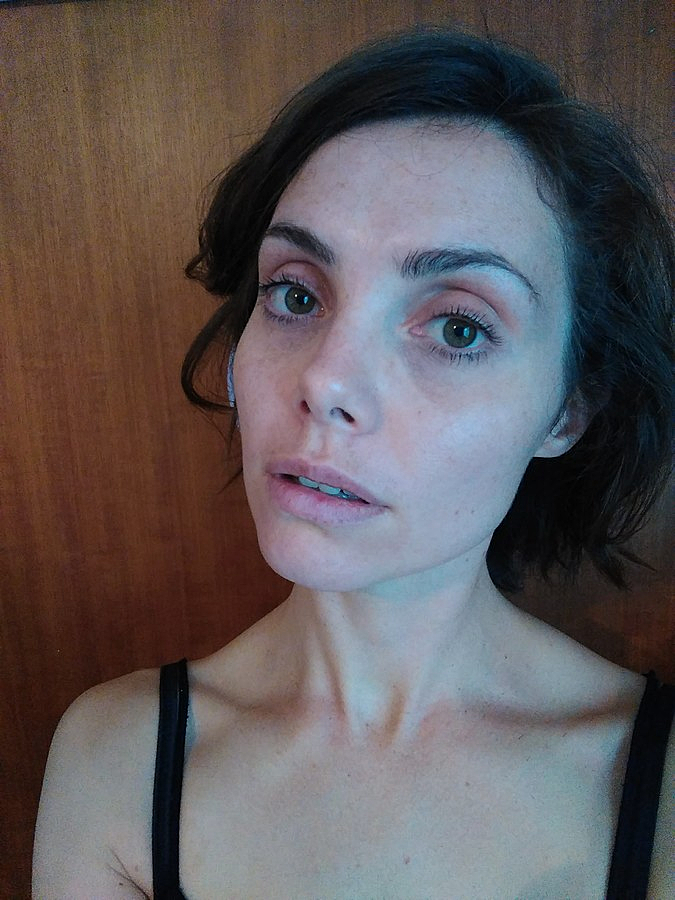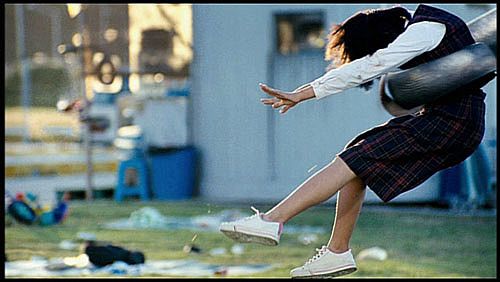Loose Canons: Alex Lodge
Alex Lodge, co-writer of the upcoming Circa play Modern Girls In Bed, shares her inspirations and influences.
Loose Canons is a series in which we invite artists we love to share five things that have informed their work. Meet the rest of our Loose Canons here.
Alex Lodge is a writer, performer and educator, having made a career out of her two great passions of oversharing and being bossy. A co-founder of full.stop.theatre along with Ed Watson and Cherie Jacobson, Lodge has co-written several acclaimed works including her most recent play with Jacobson, Modern Girls in Bed.
Lodge has worked as a performer for over ten years, with companies such as A Slightly Isolated Dog and Site Specific Theatre NZ. She recently devised and toured with Equal Voices Arts in their bilingual collection of stories about Deaf culture in New Zealand, At the End of My Hands.
Modern Girls in Bed premieres this September as part of Circa Theatre’s 2018 WTF! (Women’s Theatre Festival). Lodge plays Katherine Mansfield in this premiere season.
Blood and Guts and Emotions
I love a very particular breed of creepy, crawly, upsetting stories in the world. My two favourite writers right now are Naomi Novik and Ronald Hugh Morrieson. My favourite thing is go for a long walk alone while listening to My Favourite Murder, Last Podcast on the Left, or Casefile. Bong Joon-ho’s The Host is, in my mind, the most perfect film ever made, followed closely by The Babadook.
I often get mocked for being a morbid creep, but excuse me, guess what? Bad things happen all day, and life is really hard. That’s why we tell each other stories in the very first place, to warn each other about serial killers (all wolves in fairytales) and capitalism (all vampires are a metaphor for capitalism, don’t argue with me). I don’t think I’ve ever written anything that doesn’t owe a debt to the horror or mystery genres in some way.
PS. Watch the documentary The American Nightmare, then come talk to me about it.
Deaf Community and Dramaturgy
I’ve spent the last three years writing my PhD on the theory and practice of writing plays for the three official languages of Aotearoa (New Zealand Sign Language, Te Reo Māori and English). I’m one of those weird people who have loved doing a doctorate, and I’m genuinely sad that it’s coming to an end. I’ve had so many thoughtful and generous advisors in language, culture and storytelling along the way, including Dr Nicola Hyland, Saran Goldie-Anderson, Moko Smith and the late great Shaun Fahey.
Shaun was a Deaf actor, comedian and visual artist, as well as the embodiment of what I mean when I say that Deaf people are the world’s most naturally gifted actors. Deaf people know how to use their bodies, and have an intuitive understanding of how to turn stage presence, performative emotion and focus on and off. I worked with Shaun regularly for about three years before he became terminally ill, and I would not trade a single second of him taking the piss out of me, correcting my physical comedy to the last detail and generously teaching me NZSL during rehearsals for At the End of My Hands, for anything. I feel honoured to have been his friend, and that I got to pick his brain and call it research. His passing in early August has left a huge hole in the world.
I have talked (ranted) in several other places about Kaite O’Reilly, and her bilingual playwriting, but in short, her work has been hugely influential on me. You can read my long fangirl essay here if you like.
I was also fortunate enough to interview O’Reilly as part of my research, and one of the most important things I took from my conversations with her was the honesty of self-reflection required in meaningful collaboration. As in, understanding when to hand over your work to someone who knows more than you. When O’Reilly writes in British Sign Language, the final performed version of the Sign is developed with her creative visual director, Jean St Clair. The linguistic ownership always resides in the Deaf community.
It’s all very well to say you want to put the work before the ego, but actually doing that is a neverending, detailed journey.
Cameron freakin Reid
This is my partner Cameron Reid, who is a hell of a drummer in the band Old Loaves. Last year, he had a clot in his brain which caused a major stroke two days after his 32nd birthday. He is somehow recovering amazingly, and he and Old Loaves recently recorded their new album. I KNOW. Life is wild.
After his stroke we moved back to his Ngāti Whakaue tūrangawaewae, Rotorua, while he focuses on recovery, including reconnecting with te reo me ngā tikanga Māori. He is primary caregiver for our five-year-old son, Ted, while I am in Te Whanganui-a-Tara rehearsing and performing Modern Girls in Bed. I miss Cam and Ted a lot right now. I would be a much less accomplished artist, and person, if neither of them were in my world. Cam is my sounding board and cheerleader for every idea I attempt to drag into reality. He is also the only person other than Cherie Jacobson who I will ever admit is sometimes funnier than me. He always reminds me of that bit in Maria Bamford’s Old Baby, where she is talking to a happy couple who get awkward discussing their relationship and she snaps, “Oh I’m sorry, is it boring for you to talk about your MIRACLE?”
(Also shameless plug: Cam and I are launching our online record store, Kōpēa Records, in October. Keep an eye out. Byeeeee.)
Sarah Ruhl
I stayed away from Sarah Ruhl for a long time because she was so popular, and obvious, and although I would never admit to being a hipster, I am prone to thinking of myself as Actually Really Smarter and Cooler Than Everyone.
Then a few years ago I had to find a play for some first-year theatre students to rehearse and perform excerpts from. All the suggested texts were boring and worthy and by men. Ruhl’s name kept coming up in my searches for “feminist magical realism” and “modern feminist comedy.” I resentfully got myself a collection of her plays and couldn’t believe how good they were. The search engine was right, I was wrong, the robots will conquer us all.
Ruhl is the writer whose work I will sit down and type up when I feel at a loss creatively, just to get the feel of how her ideas are shaped. She has such clarity when it comes to narrative and character, and that means that her dialogue is always working on three or four levels at once, while sneakily looking very simple. In the opening of The Clean House, the maid and aspiring comedian Mathilde tells a dirty joke in Brazilian; then a rich doctor, Lane, complains in English about how bad at cleaning Mathilde is because she spends all her time trying to think of the perfect joke instead of cleaning. It’s is one of the greatest opening sequences ever. Go read it right now. The play is so warm and strange, and deals with the modern taboo class issue of people who have cleaners, in such a magical and weird way.
I’d also like to give a particular shout-out to an underrated Ruhl work, The Melancholy Play. It’s a story where people who become overwhelmed by a romantic melancholia suddenly begin turning into almonds. It ended up being the play I did with my first-years, and they loved it.
Whanaungatanga
My parents raised me to value both whakapapa and kaupapa whānau equally. Different, but equal. I’m lucky to have been raised in a family of artists (hi Mum and Dad, love you), and to have been supported by them unconditionally. I’m also lucky to have found a second whānau of friends, heroes and collaborators.
Artistic ancestors and the nonsense notion of ‘actual’ family as opposed to a chosen kaupapa family were some of the starting points for Modern Girls in Bed. It’s cheesy as hell, but the concept of whanaungatanga has permeated the rehearsal room for Modern Girls too. Seven women onstage, almost all of us almost all the time. A predominantly female crew. It is a loud, opinionated rehearsal room with many vagina jokes and it’s fucking wonderful. I cannot believe I get to dress up and learn next to legends like Bronwyn Turei, Renee Sheridan and Amy Tarleton.
People have asked me a few times whether it’s hard to shift from writing alone to collaborative writing like Cherie and I do. Honestly? It’s not. Because of Cherie – the only person funnier than me. Writing together is an extension of our relationship. It’s a way of taking our internal storytelling/folie à deaux, and crafting it into something intentional and productive.
One of the real-life stories which has sneakily made its way into the play is from our own friendship, when my son was first born. He was maybe six weeks old. I had no idea what post-natal depression was, but I was drowning in it. People around me could tell something was wrong, but I simply didn’t know how to articulate it. I didn’t know that it could have a name. All I knew was that I had this conviction. And I knew the conviction was ridiculous and irrational, but that didn’t make me believe it any less. It just made me too ashamed to say it aloud. And my conviction was two-fold: first, I knew I was an inherently terrible person, definitely a terrible parent; and second, something awful, probably fatal, was going to happen to my son – as a direct result of what a terrible person I was.
When I was awake with my son, I was constantly on edge, waiting for this terrible thing to come. And when I slept, all I dreamed of were horrible inescapable possibilities where I couldn’t save my baby. And it just wore me down, down, down.
So this one day, Cherie comes to visit me. And I asked Cam to tell her to come back another day, because I couldn’t bear to see anyone, or have anyone see me. He relays this to Cherie, and together, wonderfully, they dismissed this as an option. So Cam takes the baby down to the other end of the house, and Cherie comes in and sits on the end of my bed, where I’m sprawled, unable to make myself even sit up properly. And she starts talking to me, like normal. And for a moment, this normalcy gives me a sense of comfort. I open my mouth to reply-like-normal. But instead what comes out are tears. I can’t stop them, and I can’t explain them. I just hear this ridiculous sound coming from my body and I’m so ashamed to be freaking out in front of someone I love and respect so much. The shame just makes the sobbing worse, and suddenly Cherie stands up.
She walks around the bed.
Then she gets in, under the covers, and quietly sits next to me.
That was years ago, and as I’ve learned to recognise and live with my depression, I often think about that moment. What hope it gave me. To have someone see the monster inside me bare its teeth – and not run away. That action seemed to say to me, “I don’t know where you are. I don’t know what you’re afraid of. But I’m right here, under the covers, next to you.”
If that isn’t family, what is?
Modern Girls in Bed runs from 1 to 22 September at Circa Theatre. Tickets available here.






